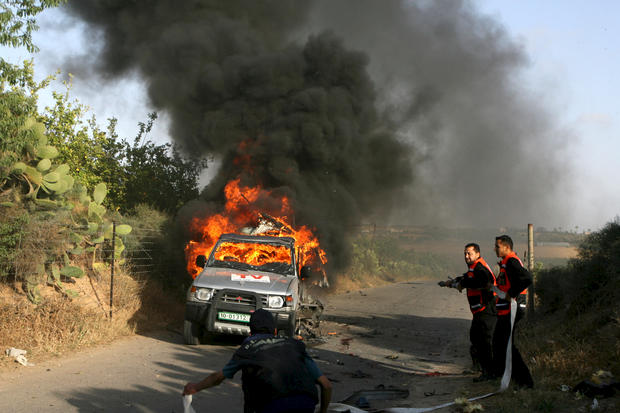
When Israel says it doesn’t target journalists, it is lying
Truther
On Sunday, the Israeli army attacked a building in Gaza City where local and international radio and television outlets are housed. As The Electronic Intifada’s Charlotte Silver commented yesterday, the Israeli army spokesperson admitted clearly and candidly that the army “obviously know there are journalists in the building.”
Six journalists were injured, including a Palestinian reporter who was resting when a missile struck the building, blowing off his right leg. Our correspondent Rami Almeghari wrote an important, harrowing story about the attacks from the journalists’ perspectives.

Today, Israeli warplanes again attacked the same media building.
The death toll since last Wednesday has reached at least 100 across Gaza.
Also today, Al Jazeera English had Mark Regev, the spokesperson for Israeli Prime Minister Benjamin Netanyahu’s office, on to explain Israel’s admitted targeting of the media building.
Regev repeated the lies that Israel doesn’t target journalists, and that the army “surgically hit” the building — claiming that Hamas’ communication facilities are on the roof of the media center.
“As far as I know, no foreign journalists were hurt whatsoever,” Regev states. Al Jazeera’s anchor then challenges Regev, asking him, “so what are you saying? Are you saying that a local Arab journalist’s life is [worth] any less than an international journalist’s?”
The exchange is worth viewing.
War crimes
Israel’s attacks on journalists is a war crime. And this is a continuation of a tactic that Israel has used against journalists, with impunity, to slam the lid on exposing the truth about its crimes in Gaza and elsewhere in Palestine. Today, the National Union of Journalists in the UK issued a condemnation of Israel’s attacks on reporters in Gaza and called for a full investigation into the Israeli army’s “deliberate attacks on media buildings.”
Since 2008, as The Electronic Intifada has reported, nearly a dozen Palestinian media outlets have been raided, and fourteen media stations have had their equipment stolen and confiscated by the Israeli military.
The Committee to Protect Journalists have issued reports on the Israeli military arresting Palestinian journalists in the occupied West Bank during demonstrations against Israel’s wall, settlements and land confiscations. CPJ also reported on the arrest by Israel of the head of the Palestinian prison news service earlier this year.
And EI’s Asa Winstanley reported last March that Israel refused to release two Palestinian journalists it had arrested, after the International Federation of Journalists appealed to Israel to do so.
In April 2008, Israel’s army killed Palestinian journalist Fadel Shana’a, a cameraman for Reuters, in a targeted tank shelling attack. Israel then exonerated itself for the killing.
After the first missile that killed Fadel, a second tank missile directly hit the Reuters vehicle in which Fadel had been traveling, killing two children and another civilian close by, and injuring 12 others, including five children. Wafa Abu Mezyed, 25, a Reuters sound man, was injured.
As Rami Almeghari reported shortly after Shana’a’s killing, “The Israeli military advocate-general stated in a 12 August letter to the Reuters news agency that it had found Israeli soldiers had acted properly in the April killing Fadel Shana’a.”
Indeed, Israel’s entrenched policy of literally shooting the messenger continues to go unchallenged.
VIEW VIDEO
